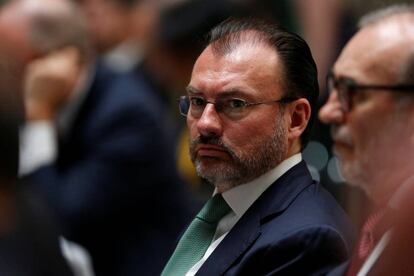Organization of American States meets to seek solution to Venezuela crisis
Country “is no longer a democracy,” says Mexican foreign affairs secretary Luis Videgaray
The crisis in Venezuela is getting worse every day. The government of Nicolás Maduro is maneuvering to cling on to power and destroy the opposition while the country is in the midst of a clear economic decline and an unsustainable humanitarian emergency. On the streets, the daily protests have already seen a death toll of 60 people, hundreds of injuries and thousands of arrests since the start of April. In this context, representatives from American states are meeting for the first time this week at the Organization of American States (OAS) to seek a diplomatic solution to the situation in the country.

All eyes are on Wednesday’s summit, which will be the last – and the most important – of a series of meetings that have been held in the regional organization over the last two months. Mexican politician Luis Videgaray on Tuesday urged for a clear resolution in the face of the severity of the crisis, and argued that American leaders must “identify the mechanisms to support reconciliation between the government and the Venezuelan opposition.”
“I believe that [Venezuela] is not a democracy right now, and we are witnessing authoritarian actions,” the diplomat stated at a conference about the Americas in Miami. Despite his criticism of Maduro, Videgaray argued in favor of a multilateral and negotiated solution.
Videgaray argued in favor of a multilateral and negotiated solution
A spokesperson from the US State Department also insisted on Tuesday on the need for the regional organization to redirect the relationship with Caracas, which a month ago abruptly announced it was leaving the OAS. “It’s a slow, methodical and multilateral process,” he said, despite the fact that the US has also taken unilateral action against the Venezuelan government by imposing sanctions last week against eight members of Maduro’s Supreme Court.
“It’s a new opportunity to highlight the level of alarm between the majority of Latin American countries and the need to debate a negotiated solution,” another US spokesperson stated.
Among the initial objectives for the summit, a number of countries – including Peru, Canada, the US, Mexico and Antigua and Barbuda – are calling on Maduro to cancel his recent plan for a National Constituent Assembly, whose aim would be to draft a new Constitution for the country that would place more power in the hands of the government.
But while the member states are seeking to build bridges, the Venezuelan opposition has indicated a number of times that it is not willing to engage in more negotiations after the failed mediation in 2016 of two ex-presidents and the Vatican. In a letter addressed to the ministers, the president of the National Assembly and key figure in the opposition, Julio Borges, drew attention to the violations of the government in terms of democratic order in order to request the formation of a delegation from different countries that could visit Venezuela to bear witness to the situation.
The government must recognize that there will be no peace if there are no elections
Ivan Briscoe, International Crisis Group
“It’s not clear whether [the summit] will achieve much,” said Ivan Briscoe, the director for Latin America at the International Crisis Group, an NGO dedicated to the study and analysis of conflicts. Briscoe added that in the face of the current situation of stalemate, any route plan that the countries agree on should count on the greatest support possible among the government and the opposition.
“It’s essential for there to be moderation in both camps,” he explained. “The government must recognize that there will be no peace if there are no elections, even if they know they are running the risk of losing them. The opposition, for its part, will also have to recognize that for there to be a peaceful transition, there must be concessions to certain members of the government, including immunity.
“If there is no communication between both sides there will not be an effective and peaceful solution to the current crisis,” Briscoe warned. Otherwise, the rise in current tensions could derive in a conflict that is even more violent.
English version by Simon Hunter.
Tu suscripción se está usando en otro dispositivo
¿Quieres añadir otro usuario a tu suscripción?
Si continúas leyendo en este dispositivo, no se podrá leer en el otro.
FlechaTu suscripción se está usando en otro dispositivo y solo puedes acceder a EL PAÍS desde un dispositivo a la vez.
Si quieres compartir tu cuenta, cambia tu suscripción a la modalidad Premium, así podrás añadir otro usuario. Cada uno accederá con su propia cuenta de email, lo que os permitirá personalizar vuestra experiencia en EL PAÍS.
¿Tienes una suscripción de empresa? Accede aquí para contratar más cuentas.
En el caso de no saber quién está usando tu cuenta, te recomendamos cambiar tu contraseña aquí.
Si decides continuar compartiendo tu cuenta, este mensaje se mostrará en tu dispositivo y en el de la otra persona que está usando tu cuenta de forma indefinida, afectando a tu experiencia de lectura. Puedes consultar aquí los términos y condiciones de la suscripción digital.








































